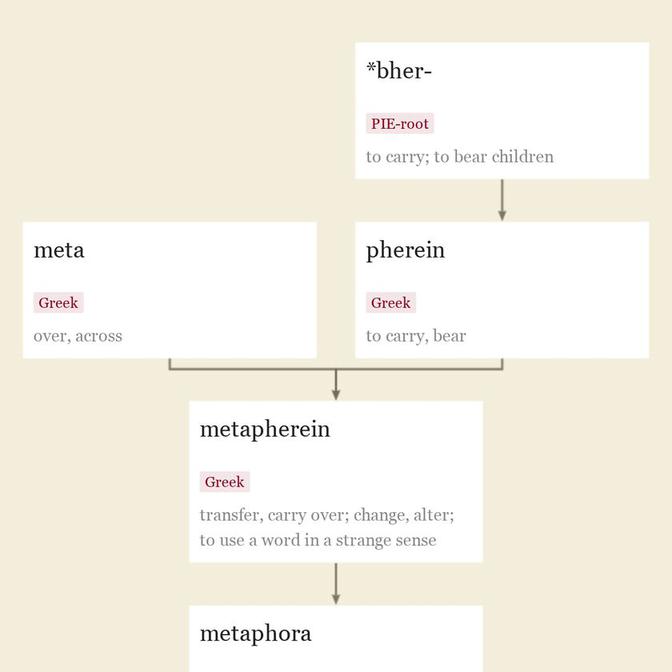metaphoric (adj.)
"比喻的或类比的性质; 非字面意义的",来自1590年代的 metaphor 和 -ic。希腊语 metaphorikos 的意思是“善于比喻”。相关词汇: Metaphorical(1550年代)“比喻的或以比喻为特征的”; metaphorically。
metaphoric 的相关词汇
中古英语中,“-ik 、-ick”均为词形成元素,表示“与...有关、具有...本质、由...制成、由...引起、类似于”,其源自法语“-ique”,并直接源自拉丁语“-icus”或同源的希腊语“-ikos”,表示“以...的方式; 涉及...的; 属于...的”。源自 Proto-Indo-European 语言的形容词后缀“*-(i)ko”,也产生了斯拉夫语“-isku”等表示起源的形容词后缀,例如在许多姓氏中,源自 -sky 的俄语“-skii”。在化学中,比起“-ous”系列名称的原子具有更高的化合价,最早见于1791年的 benzoic。
在中古英语及之后,常常将其拼写为“-ick, -ike, -ique”。在早期现代英语中,常见其变体拼写为“-ick”(例如 critick, ethick),并流传至英语词典的19世纪初期。约翰逊支持这种拼写,但韦伯斯特反对并最终占上风。

"比喻是一种修辞手法,通过将一个物体的特征赋予另一个与之相似或类似的物体; 通过转移描述性词语或短语进行比较,15世纪末出现, methaphoris(复数形式),源自法语 metaphore(古法语 metafore,13世纪)并直接源自拉丁语 metaphora,源自希腊语 metaphora “转移”,尤指将一个词的意义转移到另一个词上,字面意思是“携带过去”,源自 metapherein “转移,携带; 改变,修改; 以奇怪的意义使用一个词”,源自 meta “在...之上,在...之间”(参见 meta-)+ pherein “携带,承载”(源自 PIE 词根 *bher-(1)“携带”,也指“生育子女”)。
But a metaphor is no argument, though it be sometimes the gunpowder to drive one home and imbed it in the memory. [James Russell Lowell, "Democracy," 1884]
但是比喻并不是一个论证,尽管有时它是将论证击中要害并使之深入人心的火药。[詹姆斯·罗素·洛威尔,《民主》,1884年]
It is a great thing, indeed, to make a proper use of the poetical forms, as also of compounds and strange words. But the greatest thing by far is to be a master of metaphor. It is the one thing that cannot be learnt from others; and it is also a sign of genius, since a good metaphor implies an intuitive perception of the similarity in dissimilars. [Aristotle, "Poetics," 1459a 3-8]
确实,善于运用诗歌形式,以及复合词和奇怪的词语,是一件了不起的事情。但是,最了不起的事情是掌握比喻。这是一件无法从他人那里学到的事情; 它也是天才的标志,因为一个好的比喻意味着对不同事物之间的相似性有直观的感知。[亚里士多德,《诗学》,1459a 3-8]